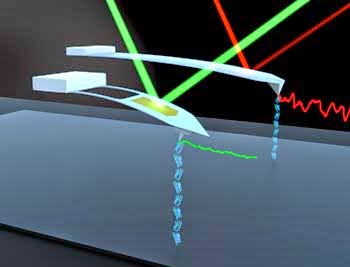JILA researchers have engineered a short, flexible, reusable probe for the atomic force microscope (AFM) that enables state-of-the-art precision and stability in picoscale force measurements. Shorter, softer and more agile than standard and recently enhanced AFM probes, the JILA tips will benefit nanotechnology and studies of folding and stretching in biomolecules such as proteins and DNA.
An AFM probe is a cantilever, shaped like a tiny diving board with a small, atomic-scale point on the free end. To measure forces at the molecular scale in a liquid, the probe attaches its tip to a molecule such as a protein and pulls; the resulting deflection of the cantilever is measured. The forces are in the realm of piconewtons, or trillionths of a newton. One newton is roughly the weight of a small apple.
The new probe design, described in ACS Nano,* is the JILA research group's third recent advance in AFM technology. JILA is jointly operated by the National Institute of Standards and Technology (NIST) and University of Colorado Boulder.
NIST:
No Compromises: JILA’s Short, Flexible, Reusable AFM Probe, Laura Ost

Comments